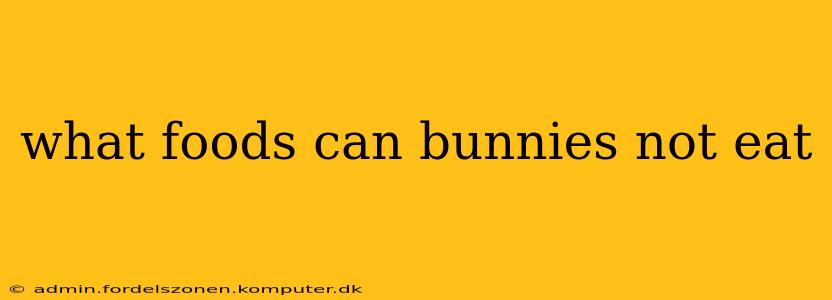Rabbits are adorable, fluffy companions, but their dietary needs are surprisingly specific. Feeding your bunny the wrong foods can lead to serious health problems, even death. Understanding what foods to avoid is crucial for ensuring your rabbit lives a long and healthy life. This guide will detail foods toxic to rabbits, as well as those that are simply unhealthy or unsuitable.
What human foods are toxic to rabbits?
Many common human foods are poisonous to rabbits. These include, but aren't limited to:
- Chocolate: Contains theobromine, which is toxic to rabbits and can cause heart problems, seizures, and even death.
- Avocado: Contains persin, a toxin that can cause vomiting and diarrhea in rabbits.
- Alcohol: Extremely toxic and can be fatal. Even small amounts are dangerous.
- Caffeine: Found in coffee, tea, and soda, caffeine is a stimulant that can be harmful to rabbits.
- Onions and Garlic: Contain compounds that damage red blood cells, leading to anemia.
- Dairy Products: Rabbits are lactose intolerant and cannot digest dairy. Milk, cheese, and yogurt can cause digestive upset.
- Processed Foods: Highly processed foods, such as chips, candy, and baked goods, are high in sugar, salt, and unhealthy fats. These offer no nutritional value and contribute to obesity and other health issues.
Are there any fruits or vegetables rabbits should never eat?
While some fruits and vegetables are healthy treats in moderation, others should be avoided entirely or given only sparingly due to their sugar content or other factors.
- Rhubarb: Contains oxalic acid, which is toxic to rabbits.
- Potatoes (raw or green): Contain solanine, a toxic compound. Cooked potatoes are also not recommended.
- Iceberg lettuce: Offers minimal nutritional value and can cause digestive upset due to its high water content.
- Large quantities of carrots: While carrots are a good source of beta-carotene, excessive consumption can lead to digestive problems and obesity.
What about common garden plants?
Many common garden plants are toxic to rabbits and should be kept out of reach. These include:
- Azaleas and Rhododendrons: Contain grayanotoxins, which are highly toxic.
- Daffodils and Tulips: Contain alkaloids that can cause vomiting, diarrhea, and heart problems.
- Oleander: Extremely toxic, even small amounts can be fatal.
- Ivy: Various types of ivy contain toxins that can cause illness.
Can rabbits eat bread?
No, rabbits should not eat bread. Bread is high in carbohydrates and lacks essential nutrients for rabbits. It contributes to weight gain and dental problems.
What about nuts and seeds?
Most nuts and seeds are high in fat and should only be given as very occasional treats, in minuscule amounts. Certain nuts contain compounds that can be harmful.
Is it okay to give my rabbit treats?
Occasional healthy treats are fine, but they should only make up a tiny fraction of your rabbit's diet. Always choose fresh, leafy greens and herbs as treats over processed foods.
What should I do if my rabbit eats something toxic?
If you suspect your rabbit has ingested something toxic, contact your veterinarian immediately. Early intervention is crucial in treating poisoning.
Remember, a rabbit's diet should primarily consist of unlimited amounts of high-quality hay, a small amount of fresh leafy greens, and a tiny portion of rabbit pellets. Always consult with a veterinarian or a rabbit-savvy expert before introducing any new foods into your bunny's diet. By following these guidelines, you can ensure your beloved bunny enjoys a long, healthy, and happy life.
